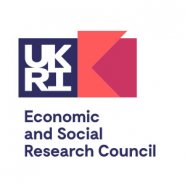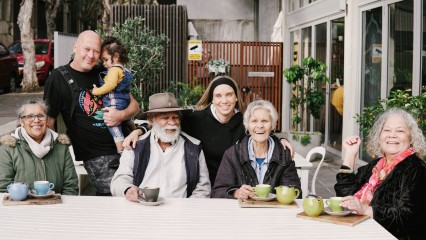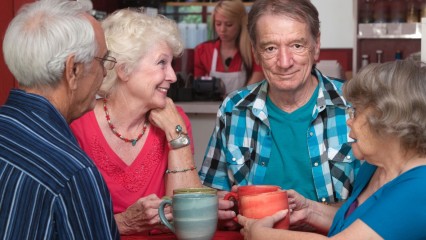
Age Inclusive Hospitality (AiH)
Start date
September 2024End date
December 2025Overview
Loneliness has been identified as a major issue among older adults in the UK, affecting an estimated 1.4 million in the UK. Age-Inclusive Hospitality (AiH) venues can help to counteract this issue by offering valuable spaces for social interaction.
Building on a previous project funded by the UKRI Healthy Ageing Challenge, ‘Hospitality Connect’, saw Dr Lorna Wang and her team conduct interviews with older adults aged 65+, hospitality businesses and policy influencers, to co-create a ‘Toolkit’ of resources to help hospitality venues become more age-friendly and to empower adults to stay socially connected.
This ESRC IAA funded project will expand the reach of the ‘Welcome ALL’ toolkit to more hospitality venues, creating impact by significantly increasing positive social interactions and reducing social isolation among older people in communities. The team will also be able to monitor and evaluate the economic and social impact on hospitality businesses of adopting the toolkit and explore the potential of a national rollout.
Participating venues
Coffee Culture, 2 Angel Gate, Guildford, Surrey
Team

Principal Investigator
Dr Lorna Wang
Associate Professor in Marketing and Revenue Management/Co-Director, Centre for Research on Ageing and Generations
Biography
Lorna joined University of Surrey in September 2017. She holds a PhD from Oxford Brookes University. She serves on the editorial boards of a number of leading hospitality and tourism management, revenue management journals. She also holds Visiting Professorship at University of Angers (France) and regularly gives talks in various Universities in Europe and in China.
Prior to her academic career, Lorna held a number of managerial positions such as Marketing Director and Rooms Division Director in China and in the UK. She won the ‘Lord Forte Award’ from the Institute of Hospitality in London in the year 2000. In China, she worked with ‘Guo-An Hotel Corporation’ based in Beijing, where she led her team to win ‘the Best Service Award’ from Beijing Tourism Administration Bureau after hosting ‘the 11th Asian Games’ in 1990. It was one of the first mega-events hosted by China and she was awarded as ‘Service Pacesetter’ in recognition of her personal contribution.

Co-Investigator
Professor Andrew King
Associate Dean (Doctoral College) Faculty of Arts, Business and Social Sciences, Professor of Sociology
Biography
I am Associate Dean (Doctoral College) for the Faculty of Arts, Business and Social Sciences (FABSS). Between July 2021 and March 2025 I was Head of Sociology. I am Co-Director of the Centre of Excellence on Ageing (CEA) and former founding Co-Chair of SGS (the Sex, Gender and Sexualities Research Group at Surrey). I lead the University of Surrey Economic and Social Research Council Impact Acceleration Account.
I have been recognised for my excellence in both research and teaching. In 2018 I received the Vice-Chancellor's Award for Research Excellence and I received the Vice-Chancellor's Award for Teaching Excellence in 2014. I am a Senior Fellow of the Higher Education Academy.
I am currently Deputy Editor of the journal, Ageing and Society and a Co-Editor of Sociology, the journal of the British Sociological Association.
During 2023/4 I was a Visiting Professor in Equality, Diversity and Inclusion at Trinity College Dublin.

Co-Investigator
Dr Kimberley Smith
Associate Professor in Clinical Health Psychology
Biography
I completed my BSc in Psychology and Neuroscience at the University of Liverpool (2004). After this I obtained my PhD from Trinity College Dublin in 2010. My PhD was concerned with exploring the link between depression and inflammation by studying the psychological impact of the Hepatitis C treatment Interferon-alpha. After completing my PhD I completed a postdoctoral fellowship in Psychiatry at McGill University in Canada (2011-2014) where we examined the link between depression and diabetes. I returned to the UK in 2014 to undertake a lectureship at Brunel University London (2014-2016) prior to joining the School of Psychology at the University of Surrey in 2016.

Rushaa Hamid
Co-Investigator, Toynbee Hall
Planned impact
This project will enhance hospitality venue managers’ and customer-facing employees’ awareness and understanding of mature customers’ needs relating to venue environment, products, services and delivery process. It will empower hospitality employees to take a co-design approach to meet the needs and wants of the older customers to facilitate positive social interactions between themselves and the customers, as well as between customers and customers. By doing so, the venues will become more age-inclusive connecting places that will yield long-term business success and making invaluable social contributions to the local community
This project also intends to increase and evidence the benefits realised by hospitality venues through the adoption of the Welcome ALL toolkit, which will then lead to the development of an Age-inclusive Hospitality initiatives/framework that could be implemented widely. Evidence such as increase in number of older customers, increase in the frequency and length of visits, increase in revenue and increase in business resilience, will be collected to inform and influence relevant social and public health policies. At the same time, by demonstrating the social value of hospitality businesses in the heart of every community, the outcomes of this project could form the basis for a business tax relief scheme that recognises and rewards local hospitality venues for their service to the community.
Furthermore, the outcomes of this project could potentially provide solutions to address the current disjointed social and public health care challenges in the UK by mobilising the hospitality sector, facilitated by the local government and social prescribing team. to co-deliver older people’s care and enable them to ageing well in their own communities.




